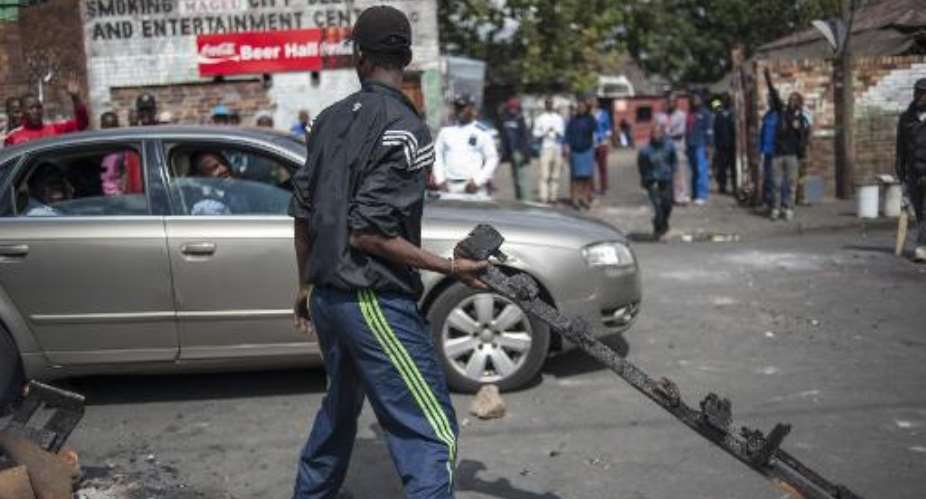Johannesburg (AFP) - South African President Jacob Zuma cancelled a state visit to Indonesia Saturday as officials scrambled to respond to deadly xenophobic violence, with scores of new arrests made in Johannesburg.
A foreigner was killed in Johannesburg, where violence erupted earlier this week, following unrest in the eastern port city of Durban, police said Saturday. However, they refused to say whether the killing was directly linked to the anti-foreigner attacks that have already claimed at least six lives.
"(I) can confirm that a case of murder is being opened and police will be investigating circumstances of his death," police spokesman Lungelo Dlamini told AFP, saying investigations continue to determine whether "the incident is related to threats of foreign nationals".
In addition to the fatalities, the unrest has forced more than 5,000 foreigners to seek refuge in makeshift camps.
"We reiterate our message that there can be no justification for the attacks on foreign nationals. These attacks go against everything we believe in," Zuma said, announcing that he would scrap his Indonesia trip "to attend to matters at home relating to the attacks on foreign nationals."
The decision came amid growing alarm within South Africa -- and from the United Nations and foreign capitals -- over the attacks.
Neighbouring Zimbabwe, Malawi and Mozambique have announced plans to evacuate their citizens.
Reflecting international concern, the United Nations High Commissioner for Refugees noted most victims targeted "are refugees and asylum seekers who were forced to leave their countries due to war and persecution."
- 'Shock and disgust' -
Saturday's violence was focused in Alexandra, an impoverished township north of Johannesburg, where police fired rubber bullets to disperse the looters.
"More than 30 people were arrested last night. At this stage the situation is calm but we plan to increase our deployment," police spokesman Dlamini said.
"They are going to be charged for public violence, malicious damage to property, house breaking and theft," he said.
The violence has been largely blamed on a speech last month by King Goodwill Zwelithini, traditional leader of the Zulus, in which he blamed foreigners for South Africa's high crime rate and said they must "take their bags and go".
The king has since said his words were misinterpreted, but for some, Zwelithini simply articulated what many were feeling.
In cancelling his Indonesian visit, Zuma rejected that notion.
"The majority of South Africans love peace and good relations with their brothers and sisters in the continent. We will engage stakeholders next week as we need all leaders to work together to bring the situation to normality. Working together we will be able to overcome this challenge."
However, anger is growing at South Africa across the region.
In Mozambique, a group of about 200 people on Friday blockaded the southern Lebombo border with South Africa, stoning South African vehicles.
In Zambia, a privately-owned radio station has stopped playing South African music in protest against the xenophobic attacks.
And in the Zimbabwean capital Harare, demonstrators marched to the South African embassy to condemn what they called the "senseless and gruesome slaughter" of fellow Africans -- a protest Zimbabwe's President Robert Mugabe echoed Saturday.
"We are glad President Zuma has assured us that this is not the South African way," Mugabe said during the country's 35th independence anniversary, when he also noted his "shock and disgust as we abhor the incident that happened in Durban where some five or six people were burnt to death deliberately by some members of the South African Zulu community."
This was not the first wave of anti-foreigner violence in South Africa. In January, foreign shopkeepers in and around the vast township of Soweto, south of Johannesburg, were forced to flee and six were killed as looters rampaged through the area.
And in 2008, 62 people -- including about 20 South Africans -- were killed in clashes across the city's townships.





 Critics fear Togo reforms leave little room for change in election
Critics fear Togo reforms leave little room for change in election
 Flooding: Obey weather warnings – NADMO to general public
Flooding: Obey weather warnings – NADMO to general public
 Fire in NDC over boycott of Ejisu by-election
Fire in NDC over boycott of Ejisu by-election
 NDC to outdoor Prof Jane Naana Opoku-Agyemang as running mate today
NDC to outdoor Prof Jane Naana Opoku-Agyemang as running mate today
 Ejisu: CPP seeks injunction to stop April 30 by-election
Ejisu: CPP seeks injunction to stop April 30 by-election
 Dismiss ECG, GWCL, GACL bosses over losses – United Voices for Change tells gov’...
Dismiss ECG, GWCL, GACL bosses over losses – United Voices for Change tells gov’...
 Submit 2023 audited financial statements by May – Akufo-Addo order SOEs
Submit 2023 audited financial statements by May – Akufo-Addo order SOEs
 Current power outages purely due to mismanagement – Minority
Current power outages purely due to mismanagement – Minority
 ECG hoists red flag to fight Ashanti Regional Minister over arrest of General Ma...
ECG hoists red flag to fight Ashanti Regional Minister over arrest of General Ma...
 Mahama’s 24hr economy will help stabilise the cedi; it’s the best sellable polic...
Mahama’s 24hr economy will help stabilise the cedi; it’s the best sellable polic...
